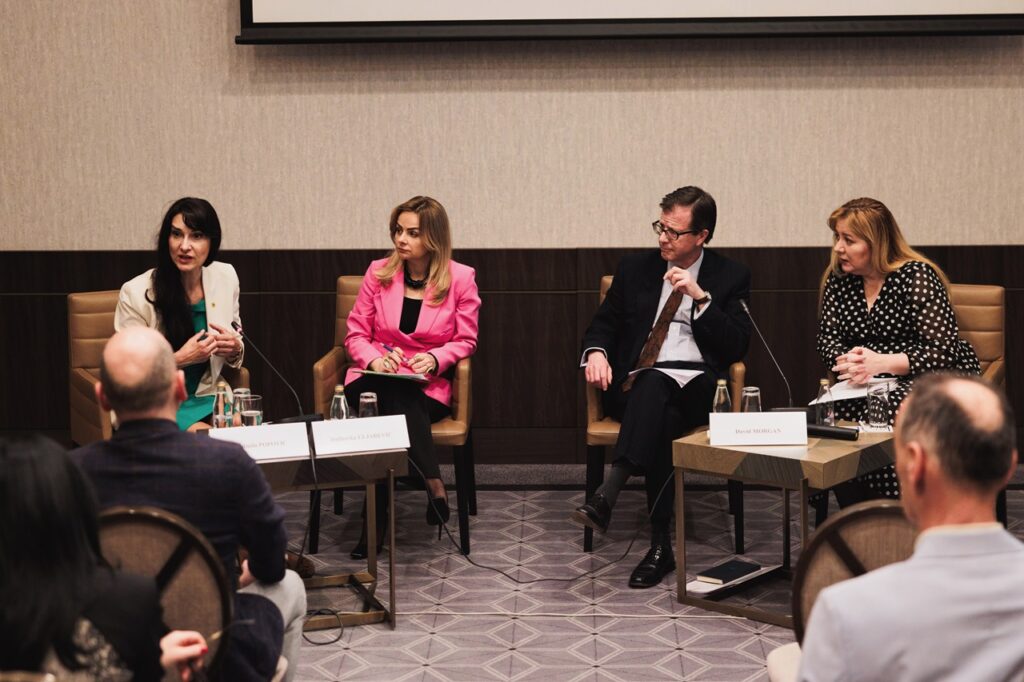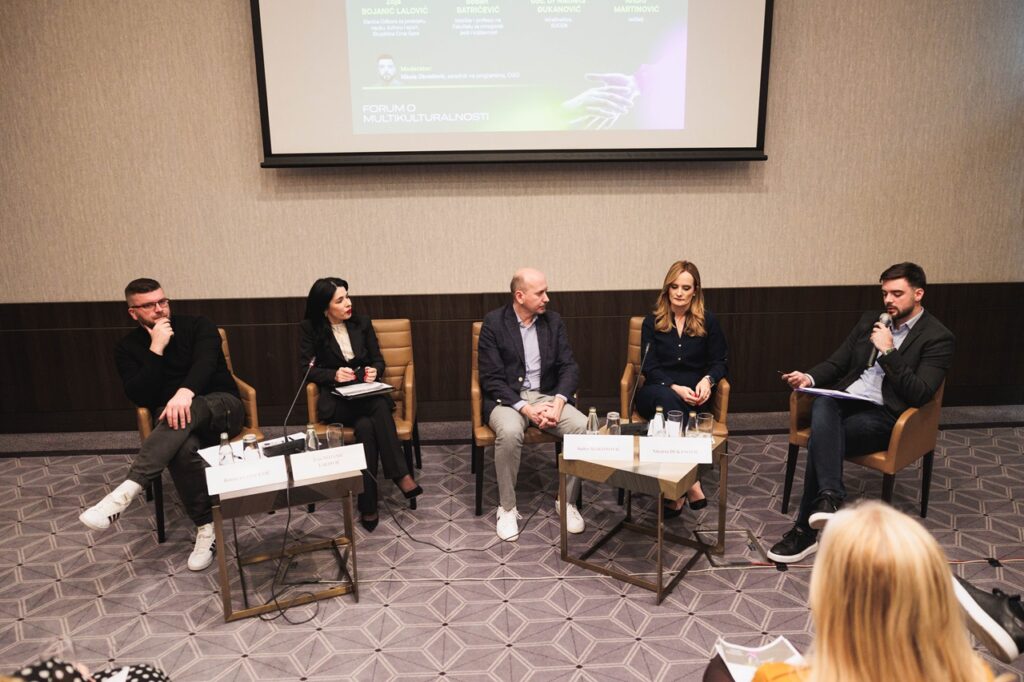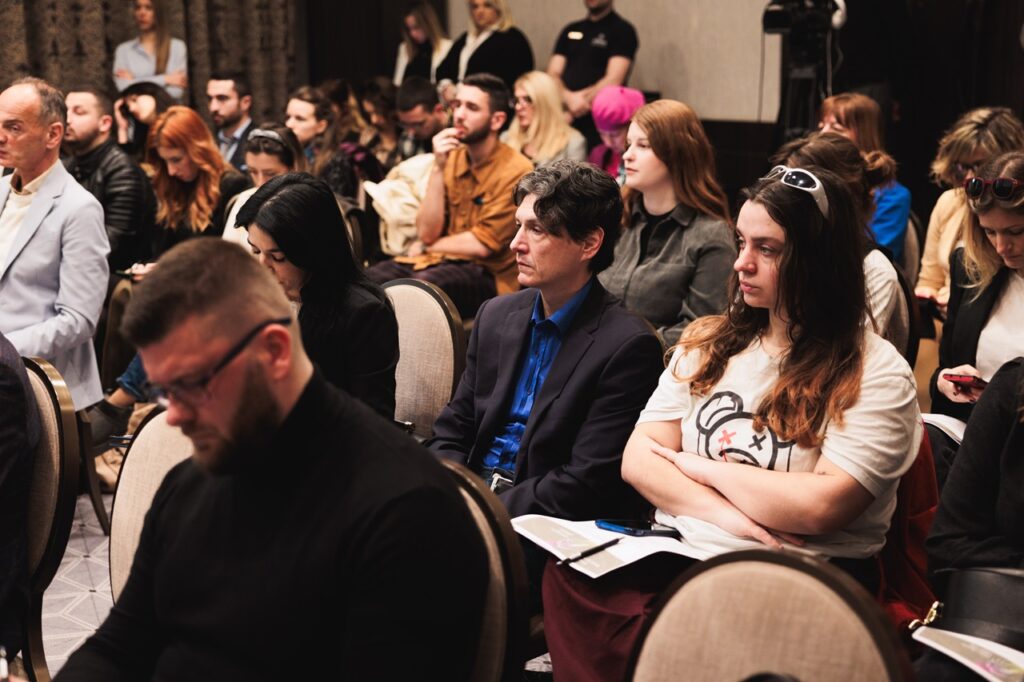“Democratization of the educational system has been lacking, and the lack of political engagement and accountability further complicates the building of a multicultural and tolerant society,” are some of the key highlights from the Forum on Multiculturalism, organized today in Podgorica by the Centre for Civic Education (CCE), with the support of the Embassy of Canada through the Canadian Fund for Local Initiatives.
Ljudmila Popović, Acting Director General Directorate for Interculturalism at the Ministry for Human and Minority Rights, stated that the focus of the Directorate, established in 2022, is on universal human rights and responsibilities, humanistic values, and awareness of inter-being. “The Directorate has entered your field, a new story, the one that CCE has been engaged with for over 20 years. This story is always unfinished, and therefore, I want to infuse hope and faith that it can be renewed, redirected, and directed towards the new development and vision of Montenegro. We hope to elevate this to a higher level, to truly become a country of interculture,” emphasized Popović.
She emphasized the richness of diversity in Montenegrin society and the necessity of caring for and utilizing such wealth appropriately. “Universal human values, rights, and responsibilities are the vision of Montenegro as an intercultural country, where we create three vital models: coexistence, solidarity, and shared responsibility for a common future. In that sense, I would emphasize that in the Directorate, we are aware of the cause-and-effect relationship between the protection of human rights, general human security, and the possibility of achieving human development goals,” concluded Popović.
David Morgan, Counselor and Deputy Ambassador of Canada, pointed out the richness of diversity in Montenegro. “Every society is subject to occasional tensions and conflicts between different ethnic and religious groups, which threaten the social cohesion and harmony of our society. No one is immune to this, and coexistence and cohesion are not automatic; tolerance must be nurtured. Both Canada and Montenegro want to create societies where all individuals, regardless of their background, feel respected, included, and valued,” he stated.
In his opinion, mechanisms for shaping an inclusive and harmonious society include education, government policies, and programmes that promote diversity, as well as dialogue and cooperation among different communities that lead to building trust. “The key to building a strong and resilient society is strengthening young people’s resilience against radicalization, extremism, and peer violence, as well as developing a safe, tolerant, and creative community that values diversity. It is our duty to equip young people with the tools to overcome these challenges and find a positive, constructive path forward,” said Morgan, highlighting the long and successful cooperation between the Canadian Embassy and the CCE.
Daliborka Uljarević, Executive Director of the CCE, emphasized that multiculturalism is not just a concept but must be a lived reality. “Instead of exposure to different perspectives improving critical thinking, understanding, and creativity, we have a situation where prejudices, stereotypes, discrimination, and we fail to develop a sense of unity and collective identity that transcends existing differences,” she assessed.
“Mr. Morgan emphasized the importance of education in nurturing multicultural values, as well as government policies and programs that provide a framework within the educational system. Unfortunately, this is not understood by decision-makers in Montenegro. We witness a dangerous manipulation of sensitive identity issues by those who, through positions in the system institutions as well as through party functions, should have a pronounced responsibility to affirm the principles of multiculturalism. Moreover, the level of provocation is constantly increasing, fueling polarization, radicalization, and extremism in society, which is otherwise insufficiently resistant to disintegrative processes,” she concluded, referring to data from CCE research indicating a growing ethnic and religious distance in Montenegro.
After the introductory part, the panel “Strengthening Multiculturalism in Montenegro – What are the Effective Mechanisms?” followed.
“Young people are shaped as individuals through education, but a large part of that also comes from the general influence of society, including politicians. Judging by the challenges our society faces, it is obvious that we have made mistakes in strengthening civic awareness and values,” assessed Zoja Bojanić Lalović, a member of the Committee for Education, Science, Culture, and Sports of the Parliament of Montenegro and a member of the DPS, during the panel. She listed the abolition of the subjects Civic Education and Ethics as compulsory as one of the important stumbling blocks in the multiculturalism story among young people. “Perhaps the concept of these subjects could have been improved, but certainly not abolished in this way. The goal of these subjects was to develop awareness of diversity, tolerance, acceptance of the different, and to work on forming civic awareness. As a member of the Committee, I will initiate the introduction of this program as compulsory, in line with the requirements of modern society,” stated Bojanić Lalović.
“The policy of multiculturalism is in crisis. The party I come from advocates the principle of equality and diversity. We will strive to continue to insist, without alternative, on a multi-ethnic, multicultural Montenegro in which the worldview will not have limits to the borders of my culture, but wider than that,” Bojanić Lalović emphasized.
“We must accept that ethnic and religious distance exists in Montenegro. Our question is how to overcome it while protecting ethnic and religious identities, because I don’t want to oppose someone who is religious and say that it doesn’t exist. My duty is to accept and respect it and enrich it with additional values,” emphasized Boban Batrićević, historian and professor at the Faculty of Montenegrin Language and Literature. He also explained that this entails harmony on issues such as those related to LGBT rights, ecology, economic parameters, and other common symbols. “If we have these common values, I cannot remain indifferent to questions about Palestine. In this context, if we enrich our identities in this way, we gain a superiority, above the inherent, imposed, or abused boundaries, so that we can then talk about something that is the beginning of multiculturalism and interculture,” Batrićević concluded.
When asked who can make progress, Batrićević does not rely on authorities. “At the moment, I do not believe in the authorities, and even if there is a change of government and the return of the DPS, I would not believe that there has been so much progress, least of all to religious organizations, but I believe in the rest of the non-governmental sector and the strengthening of civil society to be the fist that will break the paradigms imposed on us, and then in cooperation with institutions, to work to accept these actions by the ruling structure, so that the state gains the courage to intervene in the reforms of religious organizations,” said Batrićević.
“Today, we witness the rise of alarming data indicating pronounced distances among young people. And while the situation worsens, Montenegro, whether we accept it or not, has not developed adequate mechanisms, there are no policies or programmes, awareness that something like this must be addressed. In approaching the EU and its values, it would be logical that the closer we are to multicultural values, the more we have a kind of normal understanding of the different and otherness. But we see a counterproductive fact – that we are not dedicated to it. I don’t see many representatives of political parties acting in politics for the benefit of citizens, without benefiting the parties they come from,” said Dr. Nikoleta Đukanović, a researcher at SOCEN.
Đukanović also referred to the subject of Civic Education and reminded of the failure of education reforms confirmed by the results of the PISA tests. “The subject was not available to 2/3 of the students even when it was part of the program. The problem is that we do not have the democratization of education. Of course, this is a large sector that is not only autocratically set up but also lacks adequate people and institutions capable of implementing reform,” Đukanović assessed.
Director Andro Martinović emphasizes the importance of understanding how we should behave towards each other and working with young people to be ready to get to know other cultures, those that are close to them, as well as those that are distant. “When you have the opportunity to get to know something, then you are ready to understand and accept it. Everyone should keep their differences and uniqueness; I think that’s the wealth in it. It is not necessary to put pressure on yourself to make everything equally close to you, but it’s a matter of attitude and the atmosphere in society to live, work, and together create a better environment that will be such that people will want to contribute and want to stay there, rather than leave the society or let it fall apart,” said Martinović. However, as he points out, sometimes it seems that we are not far from that situation because differences are perceived here as things that coexist with very little mutual interpenetration, “which brings us back to tribal, pre-political times”.
The forum aims to create a space for discussion among various social actors on issues related to strengthening intercultural competencies, creating a positive and inclusive social environment that promotes respect, diversity, and active participation of young people. It brought together 50 representatives of educators, relevant institutions, non-governmental organizations, the academic community, and the media.
The Multiculturalism Forum concluded the project “Embrace Diversity, Empower Minds” within which numerous activities were implemented, focusing on educating youth about multiculturalism, interculturalism, and activism, as well as strengthening the competencies of employed in education on modern teaching methods on these topics, which CCE implemented with the support of the Embassy of Canada through the Canadian Fund for Local Initiatives.
Maja Marinović, Program Associate



